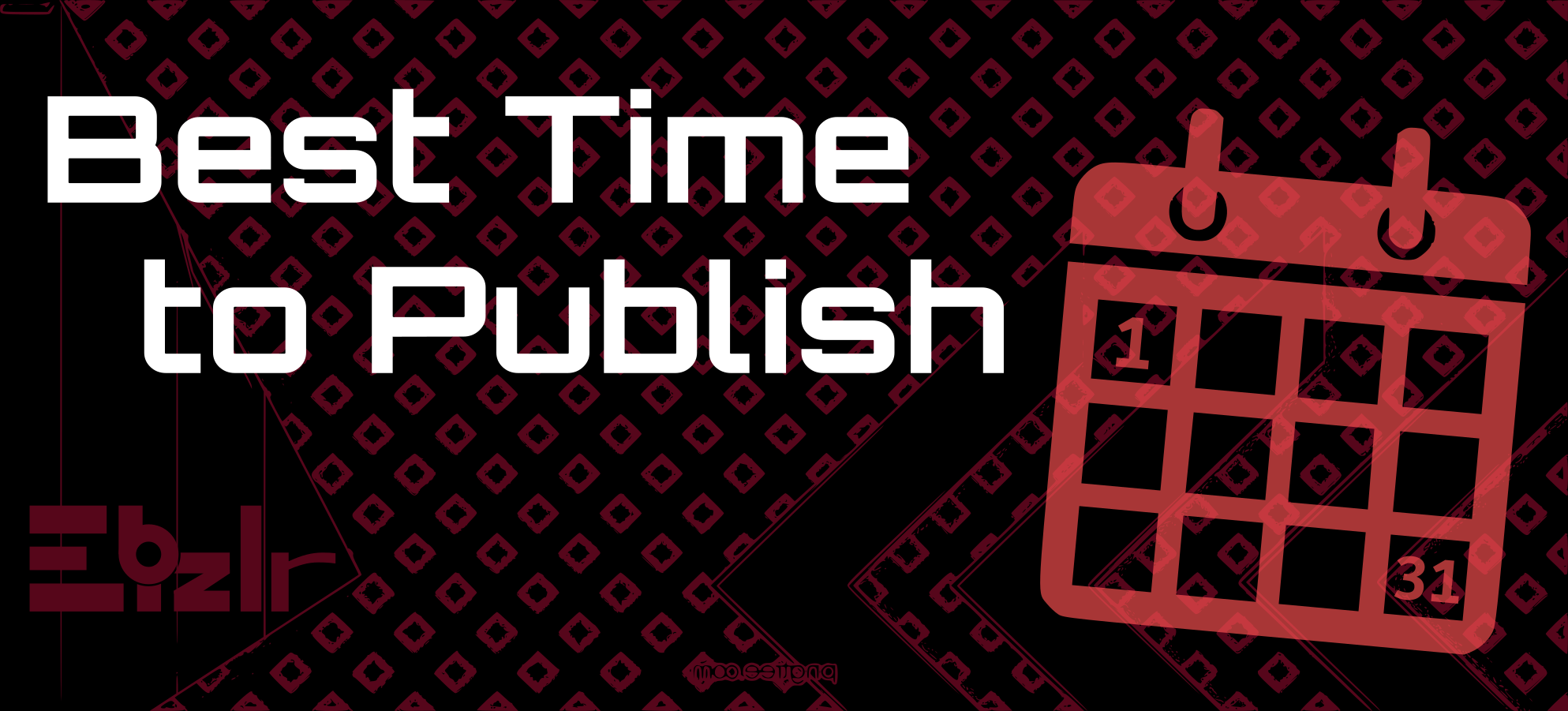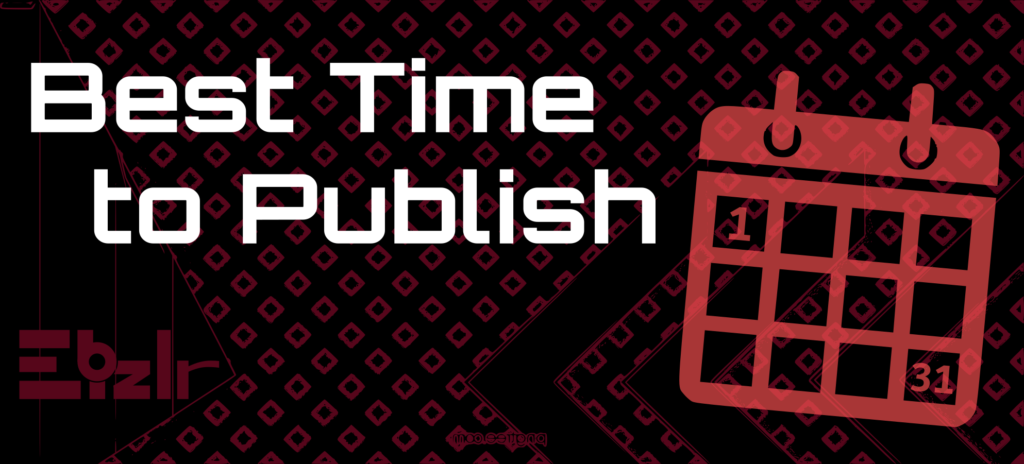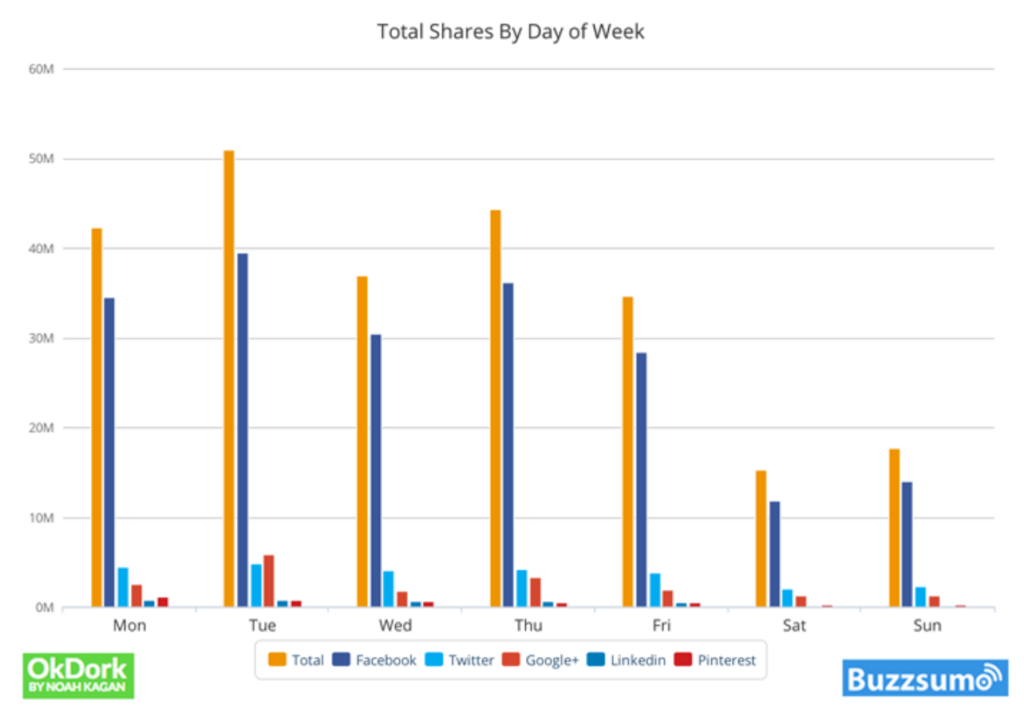Best time to publish a blog post [What 6 Surveys Say]

The best time to publish a blog post is Tuesday based on the gathered data.
But, our process of reverse engineering determined the best time to be anytime from Monday to Friday.
The best time to publish a blog post in a day is 9 AM and 6 AM. Continue reading how these publishing times were determined.

The Best Times to Publish a Blog Post
We gathered data from several studies to determine the best time to publish a blog post.
What is the best day to publish a blog post?
The best days to publish a blog post will be Monday to Friday [Explained below].
Below is the data around the best day to publish:
| Data gathered from | Best day to publish |
|---|---|
| Kissmetrics | Monday |
| TrackMaven | Sunday |
| OKDork | Tuesday |
| SproutSocial | Tuesday – Thursday |
Best day to publish a blog post [The Data]
Here is a quick look at the data gathered by each of the sources above in the form of graphs to back up their claims for the best day to publish a blog post.
Kissmetrics
Here is a graph displaying why Kissmetrics stated Monday to be the best day to publish a blog post [For traffic]:

TrackMaven
Here is a graph displaying why TrackMaven stated Sunday to be the best day to publish a blog post [For social shares]:

OkDork
Here is a graph displaying why OkDork stated Tuesday to be the best day to publish a blog post [For social shares]:

Best day to publish blog post [Applying simple logic]
There seems to be no pattern around which days are best to publish a blog post.
Here at EBIZLR, we follow no certain schedule for posting blog posts. Instead, we focus on publishing a certain number of weekly blog posts.
Let’s reverse engineer the best day. 5 of the 7 day week, the average person is doing a job. Monday to Friday.
Saturday and Sunday are free days when people go out or spend time with family.
Saturday and Sunday are definitely not the days to publish a blog post because no one wants to spend their 2 day holiday reading anything [Unless it severely piques their interest].
So, the best days to publish a blog post will be Monday to Friday.
What is the best time to publish a blog post?
The best time to publish a blog post is 9 AM – 10 AM and 6 PM – 7 PM [Explained below].
Below is the data around the best time in a day to publish:
| Data gathered from | Best time to publish |
|---|---|
| TrackMaven | 3 PM |
| SproutSocial | 9 AM – 10 AM |
Again, there is no pattern from the data on the best time to publish a blog post. However, let’s reverse engineer the best time.
The goal is to publish a blog post when most users will be active online and bother reading it.
Most people are working 9 – 5 PM. And they spend time getting ready & commute before and after work for an hour, on average.
So, they wouldn’t read it anytime before 9. And they wouldn’t read it between 5 – 6 PM. They can read it during work hours.
Or after 6 PM. The average person sleeps by 12 PM. So, the two time ranges people will read your blog posts are 9 AM – 5 PM and 6 PM – 12 PM.
For a person to read it any time within these ranges, it only makes sense to publish it at the start of the time ranges.
So, the best time to publish a blog post is from 9 AM – 10 AM and 6 PM – 7 PM.
Does it matter when you publish a blog post?
Based on the data above, and our reverse engineered logic, it doesn’t matter when you publish a blog post.
It does matter when you promote it on social media [One of the 13 methods covered in our guide to increase blog post traffic].
But, you’ll repromote it multiple times [Repurposing content] anyways, and as a result, you’ll be publishing on different days and times. [Learn 17+ methods from our guide on repurposing content]
People will read your blog post regardless.
It’s true that more people will see your blog post at certain times, but most will eventually see it regardless of social media. Another question to ask is:
No, it does not matter.
If you’ve published a blog post for SEO purposes, then that blog post isn’t considered disruptive content [Content that’s forced in front of eyes like social media].
It’s considered searchable content [Any content you have to specifically search for to see].
So, people will search for it. Therefore, it doesn’t matter when it gets published.
But, the sooner, the better.
Learn about what actually matters for SEO in our guide to blog post SEO
It’s best to publish on your blog when your target audience is most active [Another way to look at it].
The target audience is the group of people that specifically need to read your content to obtain value.
You can determine your target audience by thinking about the following?
1. What gender/ age/ ethnicity/ will the majority of your audience be?
2. What location/ timezone with the majority of your audience be in?
3. What will the salary for the majority of your audience range between?
4. What are the things the majority of your audience wants the most? [Financial freedom? Love? counselling? support? education? etc]
These are just a few questions but answering them should already give you a decent idea of who the target audience of your blog will be.
How many blog posts per week should you publish?
99Firms found that published 16+ blog posts per month results in 3.5 times the traffic you get from publishing less than 4 blog posts a month.
According to Orbit Media, 670 bloggers published 1 – 4 times a month.
Roughly 187 of these bloggers reported strong results.
Then, amongst the few who published 2 – 6 times per week, 42% reported strong results.
This proves that increasing publishing frequency improves your results.
You should publish 4 – 5 blog posts per week to see the best results.
If you’re working or studying, you should atleast publish 2 – 4 times a week to see substantial results.
If you’re focusing on content quality and creating long form content [Blog posts with 2500+ words], then try publishing atleast 1 – 2 blog posts a week, minimum.
Use topical authority to make all your content work in unison. Learn more about this in our guide on topical authority.
Don’t reduce quality to increase publishing frequency
Bloggers worry about their publishing frequency and start putting out more blog posts.
This leads to a reduction in quality. To get more blog posts out, they spend less time on each blog post.
Simply put, their focus shifts from content quality to writing more.
The blog post publishing frequency should only be increased if you have additional time to write [Learn how long it takes to write a blog post from 2651 bloggers].
It should not be increased if you plan to cut the time you take per blog post.
How to find out when a blog post was published?
There is only one solid way to find out when a blog post was published.
This will only work if the site has revealed the metadata for their publication date [Which most sites do, but you may encounter times when they don’t, so don’t freak out].
Go to the blog post page, and press CTRL + U [Works for Firefox and Chrome & Edge] or Option + Command + U on MAC.
A page full of random text will pop up. No, you’re not getting struck by a virus.
This is the HTML code OR the backend code of the page you were on.
Now use the find feature [CTRL + F OR Command + F], and search for the word “published”.
If it finds the word, you should also find the publication date nearby it. That’s it.
Often, the published date won’t be displayed on a blog post. It either won’t be there or the post will just have the date it was last updated.
But, knowing when blog posts on a site are published can give you intel on the site’s publishing frequency & consistency [Especially when doing a blog competition analysis].
It’s also good to check whether a post is outdated or not [Because you don’t want to read, learn or use outdated information].

